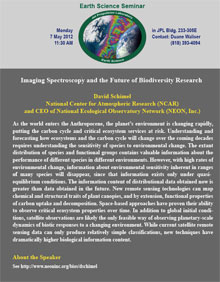Seminars
Imaging Spectroscopy and the Future of Biodiversity Research
Dr. David Schimel, National Center for Atmospheric Research; National Ecological Observatory Network
May 7, 2012 | Jet Propulsion Laboratory, 11.30 am-12.30 pm, 233-305E
About this Lecture

As the world enters the Anthropocene, the planet’s environment is changing rapidly, putting the carbon cycle and critical ecosystem services at risk. Understanding and forecasting how ecosystems and the carbon cycle will change over the coming decades requires understanding the sensitivity of species to environmental change. The extant distribution of species and functional groups contains valuable information about the performance of different species in different environments. However, with high rates of environmental change, information about environmental sensitivity inherent in ranges of many species will disappear, since that information exists only under quasiequilibrium conditions. The information content of distributional data obtained now is greater than data obtained in the future. New remote sensing technologies can map chemical and structural traits of plant canopies, and by extension, functional properties of carbon uptake and decomposition. Space-based approaches have proven their ability to observe critical ecosystem properties over time. In addition to global initial conditions, satellite observations are likely the only feasible way of observing planetary-scale dynamics of biotic responses to a changing environment. While current satellite remote sensing data can only produce relatively simple classifications, new techniques have dramatically higher biological information content.
About Dr. David Schimel

Dr. David Schimel is Chief Science Officer and Principal Investigator at the National Ecological Observatory Network. He served as a Senior Terrestrial Scientist in the National Center for Atmospheric Research Climate and Global Dynamics Division for 16 years, and was Founding Co-Director of the Max-Planck Institute for Biogeochemistry. Dr. Schimel is one of the recipients of the Nobel Peace Prize for his work in 2007 on the Intergovernmental Panel on Climate Change Report, and has authored more than 150 papers on biogeochemistry climate impacts on ecosystems and the global carbon cycle.
